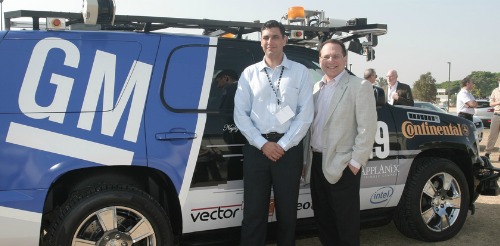At its R&D center in Herzliya, General Motors looks to Israeli engineers for tomorrow’s automotive technology, and invests in Israeli startups with exciting products to share.

What’s good for General Motors is good for America – and good for Israel, as it turns out. The American auto giant has built a significant presence in Israel – both in research and development, and as a corporate organization.
“We have been building a global network for the past decade, opening offices and development centers in countries where technology that can help GM is being developed,” says Israeli site director Gil Golan. “Israel has many good scientists and engineers, and several companies are working on technologies that will be important to GM’s future.”
Unlike most other multinationals that set up shop in Israel, General Motors has been working with Israeli partners since 1995 and opened a wholly owned corporate subsidiary in Herzliya in 2007 to concentrate on research and development.
“Most American corporations get involved with foreign markets via an acquisition or partnership,” says Golan. “But in some markets, like Israel, there is so much going on that we can take advantage of, that it makes sense to establish a more permanent presence. We see Israel as a place where GM can grow strategically.”
Investing in Israeli startups
GM Israel is involved in much more than managing an R&D lab. “We also have an engineering department which is working on technologies that will be included in future car models,” says Golan, as well as a $100 million venture capital fund seeking opportunities in two of the world’s most promising tech landscapes (the other is in Silicon Valley), managed directly from Detroit.
“We have several companies in the pipeline that we plan to invest in,” says Golan. Earlier this year, the fund supplied $5 million to Israeli startup Powermat, which makes wireless charging mats for cell phones and other electronic devices. GM plans to include the mats in vehicles as soon as 2012, allowing drivers to easily recharge their devices while on the road without having to resort to their cigarette lighter (which is anyway being phased out by most manufacturers).
GM Israel is working on developing technology in five areas for the cars of tomorrow, says Golan: “Advanced sensing and visions systems – we are at the frontier of development for GM here in Israel; human interface systems, which adapt voice and touch technology for autos; wireless enabling, allowing a vehicle’s systems to use networks to ensure constant communication; infotainment, which turns the vehicle into a hub for driver information and entertainment; and vehicle control and robotics, with the Israeli group working directly with GM tech groups in Michigan on developing the world’s most advanced robots for driverless navigation.”
Great ideas and talent emerging from Israel
How did GM “discover” Israel? It didn’t hurt that Golan is Israeli. He has worked for GM for more than a decade, most recently as director of R&D global strategy.
“We had been investing in Israeli tech partners since 1995, but it took us a few years to recognize the great ideas and talent emerging in Israel,” he says. “We had been scouring sites for development centers in the early part of this decade, and Israel came up on our radar screen,” as it did for many other multinationals that have opened facilities here.
Right now, GM Israel employs several dozen engineers and corporate officials, but Golan expects about 200 people — mostly engineers — to be on board by the end of 2013.
“The Israeli engineers and tech people we hired got involved in the company’s work very quickly, and were up to speed on GM design and engineering techniques within eight months, at which point they were able to contribute substantially to some of our important projects. In other places, that process took several years.
“We are doing some very advanced work for GM here, and within a couple of years – by the 2014 or 2015 model year – some of these innovations will be ready to be added to GM models. It will be a very exciting time for us,” Golan says.
Unlike with Internet or high-tech applications, it’s not so simple to acquire existing technology and slap it onto a new car model, says Golan. “It takes time to integrate any technology into a vehicle, because they are so complicated and require a great deal of engineering to work as efficiently as possible. Any country we set up shop in is one that we have to believe in for the long haul,” says Golan.
Obviously, Israel has the talent and technology that GM believes will help it build the cars of the future.












